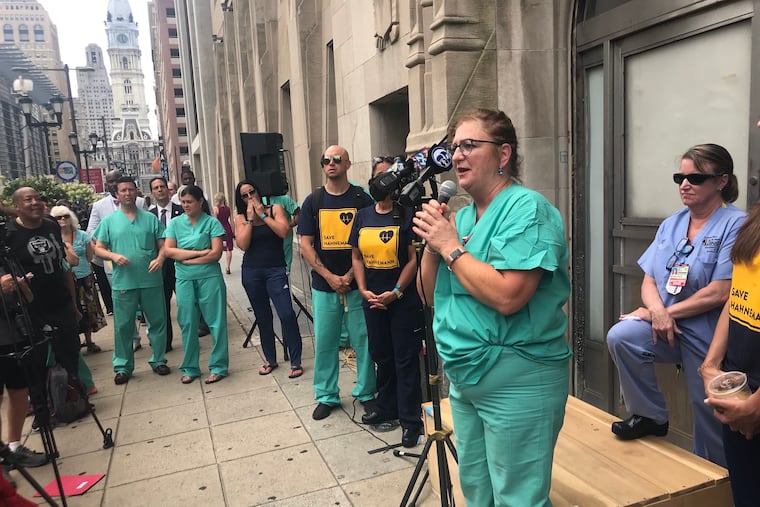Labor, state, and city officials seek last-ditch rescue funds for Hahnemann University Hospital
But people familiar with the hospital’s operations said privately that they see little chance of a last-ditch rescue due to Hahnemann’s antiquated or ineffective admissions, billing and other basic systems.

Advocates for Hahnemann University Hospital employees and elected officials who represent neighborhoods served by the Center City medical complex say they are seeking a last-ditch financial rescue that might delay or avoid the planned total shutdown of the Center City hospital and the loss of as many as 2,700 jobs.
Leaders of the Pennsylvania Association of Staff Nurses and Allied Professionals (PASNAP), the labor union representing nurses and other professionals at Hahnemann, Temple, and Einstein hospitals, said they are working with state and city officials in search of alternate funding to keep open the hospital trauma center and other units at the money-losing Hahnemann, along with the profitable St. Christopher’s, its affiliated children’s hospital in North Philadelphia.
“The commonwealth is trying to develop a plan to keep Hahnemann open,” said State Sen. Sharif Street (D., Phila.). “There are financial and structural challenges. But we are working on that.” He said he and other officials, including representatives of the state Health and Human Services Departments, have been brainstorming with officials from Temple, Penn, Jefferson, Einstein, and other systems affected by the threatened closure to review ways that Medicaid and other funds might be routed to keep Hahnemann’s key services going. He added that few of the informal advisers have agreed on what to do.
A hearing in the federal bankruptcy court in Wilmington to review and consider approval of the hospital’s financing and closing plans, scheduled for Tuesday, was postponed until Thursday by Judge Kevin Gross.
It is “obvious” that the planned shutdown “will significantly affect” Philadelphia, so hospital managers need to review “in depth” their plans with state and city officials; with Drexel University, whose faculty trains 570 doctors-in-training placed at Hahnemann for their medical residencies; and with others affected by the threatened loss before the plans are presented in court, Gross wrote in an order Monday setting up the hearing.
"The court does not want to hear that discussions were limited or did not take place,” Gross added as a warning to the hospital’s owner, California investor Joel Freedman’s Philadelphia Academic Health System LLC.
Street praised Gross for “giving us a chance to pull together.”
But people familiar with the hospital’s operations said privately that they see little chance of a last-ditch rescue due to Hahnemann’s antiquated or ineffective admissions, billing, and other basic systems. They noted that Freedman had bought the hospital only because other solutions had not materialized.
In a statement, PASNAP executive director Lisa Leshinski said her group seeks a short-term “bridge loan” to find public or other funds to replace the $15 million proposed debtor-in-possession bankruptcy financing agreed to by Allen Wilen, the EisnerAmper bankruptcy accountant heading the hospital’s reorganization, and Maurice Anselem, a rep for creditor Apollo Global Management.
That financing, priced at rates 10 percent above the benchmark rate banks charge each other, plus a $50 million operating credit facility (4 percent above the benchmark) would apply until the hospital was shut — the agreement sets Sept. 6 as a target date — and its assets are sold at auction.
In that shutdown proposal, financing would be provided by MidCap Financial Services LLC, an affiliate of Apollo, a large New York investment firm whose leaders include Josh Harris, leader of the NBA Philadelphia 76ers’ owner group.
According to the union, lenders such as MidCap charge high fees and rates of interest, which would drain Hahnemann’s assets more quickly.
MidCap was also among the lenders who financed investor Freedman’s $170 million purchase of Hahnemann and St. Christopher’s from its past owner, the for-profit Tenet hospital chain, last year.
“The evidence supports the need for a trauma center on the Hahnemann property,” Leshinski added, citing industry studies she said show that trauma center shutdowns result in more deaths of injured people in nearby neighborhoods.
Leshinski said the hospitals’ financial loss rates are not unusual among Pennsylvania hospitals, and might be reduced or eliminated if the hospitals in bankruptcy ended their lease payments for parking and other “noncore” facilities.
Nursing union leaders said they accepted that Hahnemann would have to cut services to remain in business.
Similar last-ditch proposals were made more than a decade ago in an attempt to save the former Medical College of Pennsylvania hospital in East Falls after its Pittsburgh-based owner’s financial collapse. Successor Tenet closed the MCP facility in 2004.